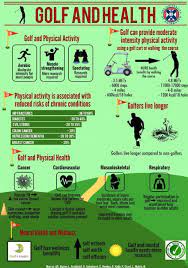Golf is a popular sport that is enjoyed by millions of people around the world. While golf is often associated with physical health benefits, such as improving cardiovascular health and increasing muscle strength, it can also have a positive impact on mental health. In this article, we will explore the relationship between golf and mental health, and the ways in which golf can promote mental wellbeing.
The Relationship Between Golf and Mental Health
Golf is a sport that requires focus, concentration, and mental discipline. Players must be able to manage their emotions, stay focused on their game, and make strategic decisions throughout the course of their round. These mental skills can have a positive impact on mental health, helping individuals to build resilience, manage stress, and improve their overall wellbeing.
Additionally, golf is a social sport that can provide opportunities for social connection and support. Many golfers enjoy playing with friends or family members, and may join clubs or leagues that provide opportunities for social interaction and support. This social support can help to reduce feelings of isolation and loneliness, which are common risk factors for poor mental health.
The Benefits of Golf for Mental Health
There are many benefits of golf for mental health, including:
Stress Reduction: Golf can be a relaxing and meditative sport that can help to reduce feelings of stress and anxiety. The peaceful surroundings, the physical activity, and the mental focus required for the game can all contribute to a sense of calm and relaxation.
Improved Mood: Golf can also help to improve mood, by increasing the production of endorphins, which are natural mood-boosters. Additionally, the social interaction and support provided by playing with others can help to reduce feelings of depression and loneliness.

Increased Self-Esteem: Golf can help to increase self-esteem and confidence, by providing opportunities to set and achieve goals, and by providing positive feedback and encouragement from others.
Improved Cognitive Function: Golf can also help to improve cognitive function, by requiring players to use their mental skills, such as problem-solving, decision-making, and strategic thinking. This can help to improve memory, concentration, and mental agility.
Better Sleep: Golf can also contribute to better sleep, by helping to reduce feelings of stress and anxiety, and by providing physical activity that can help to promote restful sleep.
Tips for Using Golf to Promote Mental Health
Practice Mindfulness: Use golf as an opportunity to practice mindfulness, by focusing on the present moment and being fully engaged in the game. This can help to reduce feelings of stress and anxiety, and can promote a sense of calm and relaxation.
Join a Club or League: Join a golf club or league to increase opportunities for social connection and support. This can help to reduce feelings of isolation and loneliness, and can provide a supportive environment for improving mental wellbeing.
Set Realistic Goals: Set realistic goals for your golf game, and focus on the process of improving your skills, rather than just the outcome. This can help to increase self-esteem and confidence, and can provide a sense of achievement and satisfaction.
Focus on the Positives: Focus on the positive aspects of your golf game, such as the peaceful surroundings, the physical activity, and the social interaction. This can help to promote a positive mood and reduce feelings of negativity and stress.
Use Golf as a Coping Mechanism: Use golf as a coping mechanism for managing stress and anxiety. When you are feeling overwhelmed or stressed, take a break and go for a round of golf to help clear your mind and reduce feelings of tension.

Golf is a sport that can have a positive impact on mental health, by promoting relaxation, reducing stress, and improving mood. Additionally, golf can provide opportunities for social connection and support, which can help to reduce feelings of isolation and loneliness. By using golf as a tool for promoting mental wellbeing, individuals can improve their overall quality of life and build resilience to manage the challenges of daily life. With the right approach and preparation, golf can be a valuable tool for improving mental health and wellbeing.
Examples of Using Golf to Promote Mental Health
Veterans Golf Program: The Veterans Golf Program is a non-profit organization that uses golf as a tool to promote mental health and wellbeing for military veterans. The program provides opportunities for veterans to learn and play golf, and to connect with other veterans in a supportive and inclusive environment.
Golf for Good: Golf for Good is a social enterprise that uses golf as a tool for promoting mental health and wellbeing for children and young people. The program provides golfing opportunities for children and young people, and uses the sport to teach life skills, build self-esteem, and promote resilience.
Golf for Parkinson’s: Golf for Parkinson’s is a program that uses golf to promote physical and mental wellbeing for individuals with Parkinson’s disease. The program provides opportunities for individuals with Parkinson’s to learn and play golf, and to connect with others who are living with the disease.
Women’s Golf Network: The Women’s Golf Network is a community of women who use golf as a tool for promoting mental health and wellbeing. The network provides opportunities for women to connect with other women who share a passion for golf, and to use the sport as a tool for building resilience and managing stress.
Conclusion
Golf is a sport that can have a positive impact on mental health, by promoting relaxation, reducing stress, and improving mood. By using golf as a tool for promoting mental wellbeing, individuals can improve their overall quality of life and build resilience to manage the challenges of daily life. With the right approach and preparation, golf can be a valuable tool for improving mental health and wellbeing, and can provide opportunities for social connection and support. Whether you are a seasoned golfer or a beginner, there are many ways to use golf to promote mental health and wellbeing, and to build a healthier and happier life.



